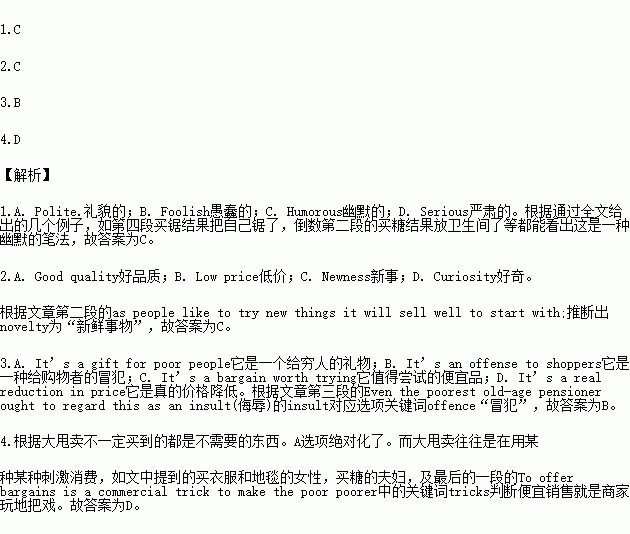题目内容
A bargain is something offered at a low and advantageous price. A more recent definition is: a bargain is a dirty trick to force money out of the pockets of silly and innocent people.
The cost of producing a new - for example - toothpaste would make 80p the proper price for it, so we will market it at £1.20. It is not a bad toothpaste, and as people like to try new things it will sell well to start with; but the attraction of novelty soon fades, so sales will fall. When that happens we will reduce the price to £1.15. And we will turn it into a bargain by printing 5p OFF all over it.
Sometimes it is not 5p OFF but 1p OFF. What breathtaking rudeness to advertise 1p OFF your soap or washing powder or whatever! Even the poorest old-age pensioner ought to regard this as an insult(侮辱), but he doesn’t. A bargain must not be missed. People say one has to have washing powder (or whatever) and one might as well buy it a penny cheaper.
The real danger starts when unnecessary things become ‘bargains’. Many people just cannot resist bargains. Provided they think they are getting a bargain they will buy clothes they will never wear or furniture they have no space for. Once I heard of a man who bought an electric saw as a bargain and cut off two of his fingers the next day. But he had no regrets: the saw had been truly cheap.
Quite a few people actually believe that they make money on such bargains. A lady once told me: “I’ve had a lucky day today. I bought a dress for £120, reduced from £400; and I bought a beautiful Persian carpet for £600, reduced from £900.” It will never occur to her that she has actually wasted £720. She feels as though she had made £580. She also feels, I am sure, that if she had more time for shopping, she could make a living out of it.
Some people buy in large quantities because it is cheaper. Once a couple bought enough sugar for their lifetime and the lifetime of their children and grandchildren. They thought it a bargain not to be missed. When the sugar arrived they didn’t know where to store it – until they realized that their toilet was a very spacious one. So that was where they piled up their sugar. Not only did their guests feel rather strange whenever they were offered sugar to put into their coffee, but the toilet became extremely sticky.
To offer bargains is a commercial trick to make the poor poorer. When greedy fools fall for this trick, it serves them right.
1.Which word best describes the language style of the passage?
A. Polite. B. Foolish. C. Humorous. D. Serious.
2.What does the underlined word “novelty” in Paragraph 2 probably mean?
A. Good quality. B. Low price.
C. Newness. D. Curiosity.
3.How does the author feel about 1p OFF a product?
A. It’s a gift for poor people.
B. It’s an offense to shoppers.
C. It’s a bargain worth trying.
D. It’s a real reduction in price.
4.Which statement will the author probably agree with?
A. Bargains are things people don’t really need.
B. Bargains are often real cheap products.
C. Bargains help people make a living.
D. Bargains play tricks on people.
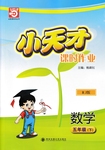 小天才课时作业系列答案
小天才课时作业系列答案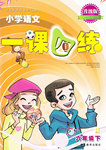 一课四练系列答案
一课四练系列答案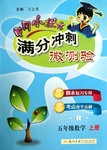 黄冈小状元满分冲刺微测验系列答案
黄冈小状元满分冲刺微测验系列答案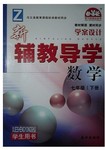 新辅教导学系列答案
新辅教导学系列答案